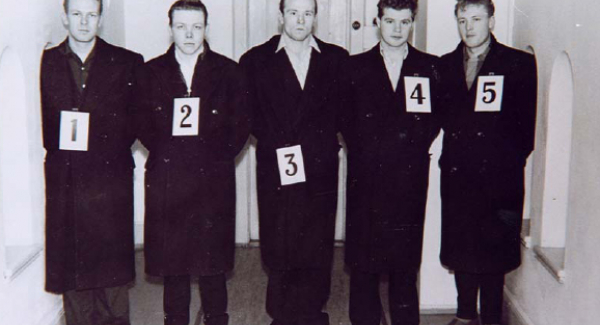Gossip is ubiquitous – chances are that you have shared, heard, or been the topic of gossip today. Why do we love to talk about other people? Is gossiping part of our human nature? Are there benefits of gossip, to either the individual or to society? In this article I will review what researchers have learned about the nature of gossip, its bad reputation, and the numerous functions it serves in society.
The dish on gossip: Its origins, functions, and bad reputation
Think about the last conversation you had. What did you talk about? Was the conversation focused on yourself, or your conversation partner? Did someone else come up in the conversation? It has been estimated that most of our daily conversation is social in nature (that is, about people, rather than. say, work or the weather) and that gossip makes up a large part of this social talk (Emler, 1994; Foster, 2004). What’s more, this is true not only in industrialized societies, but across cultures (Ben-Ze’ev, 1994; Dunbar, 2004). Even those who may adamantly deny ever gossiping about others would no doubt have to admit that they have listened to gossip, or been the target of gossip, at some point in their lives. Gossip is ubiquitous, yet it remains largely misunderstood by most people. The goal of this paper is to elucidate what psychologists and other researchers have learned about gossip and its role in society, while also clearing up some common misperceptions about gossip (e.g., that it is completely meaningless, or always negative). To this end, the paper is framed around three main questions: Why does gossip have such a bad reputation? Is gossiping part of our human nature? And what functions does gossip serve? But first, let’s take a closer look at what is meant by the term “gossip” in the first place.
Defining Gossip
Gossip’s Bad Reputation
For being such a wide-spread activity, gossip certainly has a poor reputation. There are many potential reasons why gossip is generally regarded with disdain. Many religious doctrines look down on the act of gossip (e.g., “A talebearer reveals secrets, but he who is of a faithful spirit conceals a matter,” Proverbs 11:13; “Do not speak ill of each other behind their backs,” Al-Hujurat 49:12). Being the target of gossip can obviously be an unpleasant experience, especially when the gossip is reputation-damaging or downright false (Paquette & Underwood, 1999). People also have generally negative views of individuals who share negative gossip. In one study, women who spread negative gossip in the workplace were viewed as more power-seeking and less emotionally warm than women who did not spread negative gossip (Farley, Timme, & Hart, 2010). Additional reasons for the condemnation of gossip include the fact that gossip gives power (in the form of knowledge) to lower-status individuals (such as women, see De Sousa, 1994), and that it makes private matters public (Schoeman, 1994; Solove, 2007). The dumbwaiter was purportedly created so that servants could not overhear and share the personal matters of their employers (Hecht, 1956, cited in Foster, 2004, p. 78). Thus, many argue that society’s degradation of gossip stems from the fact that it threatens those in power, who respond in turn by trying to prohibit its occurrence.
Although many view gossip as nothing more than frivolous or hurtful speech that should be eliminated altogether, researchers who study gossip have found much evidence to the contrary. It turns out that gossip actually serves a wide array of useful functions, and that its roots may even be traced back to our primate ancestors.
The Evolutionary Origins of Gossip
We have learned where the word gossip comes from, but what about the origins of the act itself? Since gossip constitutes such a large part of human dialogue, some researchers believe that an understanding of its origins may involve understanding the origins of language itself. British anthropologist and evolutionary psychologist Robin Dunbar believes that language, and particularly social language, evolved as a mechanism for group bonding, and as a way to monitor the members of our social networks. Research has shown that members of all primate species engage in social grooming behaviors (i.e., cleaning or grooming each other's fur) in order to create and maintain important social relationships, and it is proposed that humans achieve these same goals by engaging in social talk – by gossiping (e.g., Dunbar, 1996, 2004). As will be discussed in more detail below, the exchange of gossip demonstrates trust and establishes friendships between individuals, and establishes norms for acceptable behavior within the group (Foster, 2004). Gossip allows information about cheaters and free-riders(basically the “bad seeds” of society) to be shared widely, so that you know not to trust “deceitful Dave” without having to actually interact with him and learn firsthand that he should be avoided. Gossip is such a vital part of human interaction that Dunbar goes so far as to make the claim “without gossip, there would be no society” (2004, p. 100).
Others have made similar arguments for the adaptiveness of gossip, claiming that the particular types of gossip people are interested in are precisely those that would boost someone's social status within the group. Specifically, McAndrew and Milenkovic (2002) provide evidence that people are more likely to pass on negative information about strangers and high-status individuals, and positive information about friends and family. Although (as the authors admit) this is by no means evidence for an evolution-based explanation of gossip, they contend that it is consistent with the idea that gossip may have evolved as a mechanism for individual status-enhancement. Researchers have also suggested that our obsession with celebrity gossip may stem from the fact that in terms of evolutionary history, celebrities are a novel occurrence. As such, the cognitive mechanisms we evolved to allow us to keep track of our in-group members are incapable of distinguishing between our real in-group members (e.g., friends and family) and other individuals that we see frequently and know a lot about (e.g., the stars of our favorite television shows; Barkow, 1992; McAndrew & Milenkovic, 2002).

The Functions of Gossip
Researchers have proposed a wide variety of gossip functions, arguing that gossip serves a purpose and is not merely “idle chatter” (e.g., Fine & Rosnow, 1978). Here I will focus on the different functions gossip may serve for individuals, though it is noted that some of the functions of gossip may occur more at a collective-level (serving the purposes of the group rather than the individual). Many different functions of gossip have been proposed over the years, but they generally fall within two main categories: Mastery functions and connectedness functions.
Mastery functions
Mastery functions refer to those functions of gossip that help individuals learn about their social worlds, allowing people to understand and predict events in order to obtain rewards (Smith & Mackie, 2007). It turns out that we can learn a whole lot “through the grapevine.” Gossip provides us with information not only about specific others, but about our culture more generally, as well as information about ourselves. That gossip provides information about other people is more or less definitional, and we have already touched on one of the main reasons why such information is so important – because it lets us know who to avoid interacting with, without having to learn the hard way (i.e., firsthand) that the person is a liar or a cheat. Positive gossip can also be helpful, of course – for example, you may learn from a friend that a potential romantic partner shares your love of modern art, and this motivates you to ask him or her out on a date. Or you may be deciding whether to accept a job offer and learn from current employees that your potential boss is very family-oriented and flexible in terms of work hours. This type of personal information is unlikely to be found anywhere else except in the form of gossip, making gossip an extremely important form of inquiry (Ayim, 1994).
The information function of gossip is not limited to learning about specific individuals; it also teaches us about the norms and rules of our culture more generally. Imagine that you’ve accepted that new job, and in the lunchroom one day a colleague complains to you about another co-worker who “always takes bagels from the lunchroom, but never brings any in.” In this situation, not only are you learning something about this particular colleague (that he or she is selfish), but you are also learning about a norm in your workplace (that taking bagels is fine, so long as you’re also willing to bring them in). We don’t have to witness the co-worker being chastised to learn how to avoid his or her fate - we can learn as much from gossip (Baumeister, Zhang, & Vohs, 2004).
Even though gossip is most often associated with adults and adolescents, sociologist Gary Alan Fine (1977) has observed that children begin to gossip about as soon as they begin to speak, and it is clearly a way in which they learn about the social world. By gossiping about the experiences of their peers, children and adolescents learn what is and is not appropriate in a wide range of social situations, from the type of clothing one should wear to school, to how to behave on a first date (Fine, 1977). Other research has noted that the creation of peer culture is not a passive process whereby children attempt to reproduce adult culture, but an active process that involves negotiating and resisting social roles and cultural categories (Gaskins, Miller, & Corsaro, 1992). Importantly, the creation of peer culture comes about largely through children’s peer talk, which of course includes gossip – something that plays a key role in conflict negotiation and the establishment of status within the peer group (Kyratzis, 2004).
Finally, as mentioned previously, gossip can also tell us information about ourselves, and it does this through the process ofsocial comparison. According to social comparison theory (Festinger, 1954), people have a fundamental desire to evaluate their abilities and opinions, and when objective evaluations are not possible, people will compare their abilities and opinions with similar others, in order to get a sense of where they stand. For example, if I want to get a sense of how sociable or popular I am (for which an objective measure may be hard to find), I might compare the number of Facebook friends I have with those of my peers. According to Sarah Wert and Peter Salovey, all gossip involves social comparison. Whereas direct comparisons with others can lead to awkward moments or tension (for example, you wouldn’t want to ask a friend how much money she makes, or how many men she has slept with), gossip allows us to compare ourselves with others in an indirect manner, gathering information about our peers from other people, and thereby avoiding the risks involved in direct comparisons (Wert & Salovey, 2004).
Connectedness functions
Connectedness functions refer to those functions of gossip that help individuals obtain acceptance and liking from important individuals and groups (Smith & Mackie, 2007). Gossip helps us connect by strengthening bonds between gossip-tellers and receivers (in the case of face-to-face gossip), and also by creating a web of shared knowledge and entertainment (in the case of celebrity gossip, which may travel from one source to millions of people).
Sharing gossip can strengthen the bond between two individuals by demonstrating trust. Gossiping with someone, particularly if it involves sharing a piece of scandalous information, implies that a certain level of confidence exists between the two parties, or at least that the gossiper has confidence in the gossip recipient. Not surprisingly, most gossiping occurs among friends, and gossip can even be used strategically to keep certain people on the “outside” (Foster, 2004). As noted by McDonald and colleagues (2007) in their examination of gossip among fourth-grade girls, negative gossip is shared not only to harm the target of the gossip, but to enhance the connection between the pair of friends who exchange the gossip. Thus, gossip (particularly negative gossip) both requires a certain level of trust and friendship, and also works to enhance the social bond between gossiping parties.
The role of gossip as a communicator (or creator) of culture (Baumeister, et al., 2004; Kyratzis, 2004; Lyons & Kashima, 2001), described above as serving mastery goals, can also clearly be seen as serving connectedness functions. Learning group norms does not just tell us how to behave in order to obtain desired outcomes (e.g., getting that promotion), but it helps establish ourselves as good group members, deserving of respect and acceptance by the in-group.

Finally, gossip can be a form of entertainment, as evident in the countless magazines and websites that exist purely for the purpose of sharing celebrity gossip. Although this entertainment function of gossip does not necessarily serve connectedness motives (e.g., you can sit at your computer alone, reading about the latest celebrity feud), I would argue that reading about celebrity gossip is even more entertaining when it is recounted with friends, either in person or sharing links via social networking sites. The fact that celebrity gossip is so widespread also means that it may provide unacquainted individuals with common ground – a way to break the ice, allowing new connections to be made. Gossiping in general--not just about celebrities--can also function as a form of entertainment, and Fine and Rosnow (1978) argue that this is likely to be one of the major functions of gossip in situations in which friendship is already established and “there are no external needs or threats” (p. 164). Others have argued that gossip shares similarities with other entertainment-focused activities that strengthen social bonds, such as conversational humor (Morreall, 1994), and joking (Ben-Ze’ev, 1994).
Conclusion
Gossip is an undeniable part of human life, and despite its bad reputation, it serves many important functions in society. Far from empty or mindless talk, the motives and consequences of gossip can be much more complex than most people realize. And while it can, at times, be hurtful or troublesome, there are numerous positive benefits associated with (even negative) gossip. Although long-ignored by academics as a topic too frivolous for study, many researchers have begun to examine gossip more closely - and I encourage you to do the same when you encounter gossip in your own life.
References
Ayim, M. (1994). Knowledge through the grapevine: Gossip as inquiry. In R. F. Goodman & A. Ben-Ze’ev (Eds.), Good Gossip (pp. 85-99). Lawrence, KS: University Press of Kansas.
Barkow, J. H. (1992). Beneath new culture is old psychology: Gossip and social stratification. In J. H. Barkow, L.
Cosmides, & J. Tooby (Eds.), The adapted mind: Evolutionary psychology and the generation of culture (pp. 627-637). New York, NY: Oxford University Press.
Baumeister, R. F., Zhang, L., & Vohs, K. (2004). Gossip as cultural learning. Review of General Psychology, 8, 111-121.
Ben-Ze’ev, A. (1994). The vindication of gossip. In R. F. Goodman & A. Ben-Ze’ev (Eds.), Good Gossip (pp. 11-24). Lawrence, KS: University Press of Kansas.
Corsaro, W., & Eder, D. (1990). Children’s peer cultures. Annual Review of Sociology, 16, 197-220.
De Sousa, R. (1994). In praise of gossip: Indiscretion as a saintly virtue. In R. F. Goodman & A. Ben-Ze’ev (Eds.), Good Gossip (pp. 25-33). Lawrence, KS: University Press of Kansas.
DiFonzo, N. (2008). The watercooler effect: A psychologist explores the extraordinary power of rumors. New York, NY: Penguin Group.
Dunbar, R. I. M. (1996). Grooming, gossip, and the evolution of language. London: Faber & Faber.
Dunbar, R. I. M. (2004). Gossip in evolutionary perspective. Review of General Psychology, 8, 100-110.
Emler, N. (1994). Gossip, reputation, and social adaptation. In R. F. Goodman & A. Ben-Ze’ev (Eds.), Good Gossip (pp. 117-138). Lawrence, KS: University Press of Kansas.
Festinger, L. (1954). A theory of social comparison processes. Human Relations, 7, 117-140.
Fine, G. A. (1977). Social components of children’s gossip. Journal of Communication, 27, 181-185.
Fine, G. A. & Rosnow, R. L. (1978). Gossip, gossipers, gossiping. Personality and Social Psychology Bulletin, 4, 161-168.
Foster, E. K. (2004). Research on gossip: Taxonomy, methods, and future directions. Review of General Psychology, 8, 78-99.
Gaskins, S., Miller, P. J., & Corsaro, W. A. (1992). Theoretical and methodological perspectives in the interpretive study of children. In W. A. Corsaro & P. J. Miller (Eds.), Interpretive Approaches to Children’s Socialization: New Directions for Child Development (pp. 5-24). San Francisco, CA: Jossey-Bass.
Hecht, J. J. (1956). The domestic servant class in eighteenth-century England. London: Routledge & Kegan Paul.
Kyratzis, A. (2004). Talk and interaction among children and the co-construction of peer groups and peer culture. Annual Review of Anthropology, 33, 625-649.
Lyons, A. & Kashima, Y. (2001). The reproduction of culture: Communication processes tend to maintain cultural stereotypes. Social Cognition, 19, 373-394.
McAndrew, F. T. & Milenkovic, M. A. (2002). Of tabloids & family secrets: The evolutionary psychology of gossip. Journal of Applied Social Psychology, 32, 1064-1082.
McDonald, K. L., Putallaz, M., & Grimes, C. L. (2007). Girl talk: Gossip, friendship, & sociometric status. Merrill-Palmer Quarterly, 53, 381-411.
Morreall, J. (1994). Gossip and humor. In R. F. Goodman & A. Ben-Ze’ev (Eds.), Good Gossip (pp. 56-64). Lawrence, KS: University Press of Kansas.
Paquette, J. A. & Underwood, M. K. (1999). Gender differences in young adolescents' experiences of peer victimization: Social and physical aggression. Merrill-Palmer Quarterly, 45, 242-266.
Schoeman, F. (1994). Gossip and privacy. In R. F. Goodman & A. Ben-Ze’ev (Eds.), Good Gossip (pp. 72-82). Lawrence, KS: University Press of Kansas.
Smith, E. R., & Collins, E. C. (2009). Contextualizing person perception: Distributed social cognition. Psychological Review, 116, 343-364.
Smith, E. R., & Mackie, D. M. (2007). Social psychology (3rd edition). New York, NY: Psychology Press.
Solove, D. J. (2007). Free speech, anonymity, and accountability. In D. J. Solove, The future of reputation: Gossip, rumor, & privacy on the Internet (pp. 125-160). Yale University Press.
Wert, S. R., & Salovey, P. (2004). A social comparison account of gossip. Review of General Psychology, 8, 122-137




